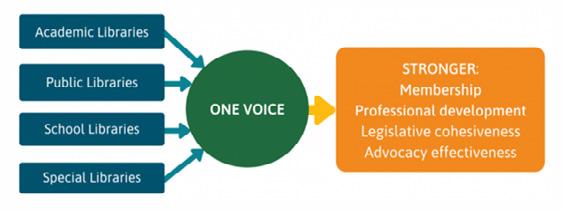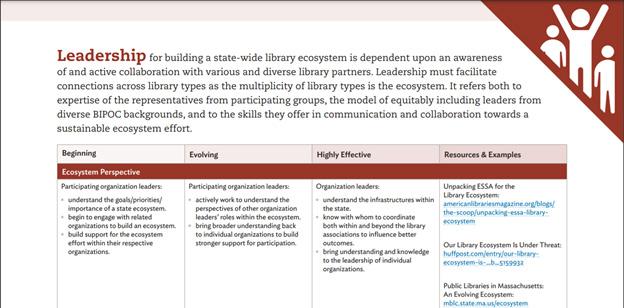
5 minute read
One Voice
STRENGTHENING OUR TLA LIBRARY ECOSYSTEM
By Dorcas Hand
IT IS TOO EASY to get completely involved in our own piece of the library pie, our silo, whether we are serving a K-12 school population, a public library, a community college or university, a genealogy or archival library, or a corporate setting. All of our siloed skills are important to our patrons every day – but with collaboration across library types, our skills serve every patron throughout life. The structure of the Texas Library Association (TLA) demonstrates the existence of a Texas Library Ecosystem. All of us who are members have the bond of the same library science degree or certification training even though we work in different kinds of libraries with an even bigger variety of subspecialties. That is One Voice in action.
I began to learn about advocacy here in Texas with TLA, but much of my experience leading advocacy efforts has come at the national level and at the local Houston level. That exposure led me to an interesting opportunity. In Winter 2018, I was asked to chair an American Library Association (ALA) Task Force to develop an Ecosystem Toolkit. The task force was overseen by the ALA Committee on Library Advocacy (COLA), a group that serves some of the same functions as the TLA Legislative/Advocacy Committee. The task force developed a toolkit that we hope is useful to state and regional library legislative and advocacy efforts across the country. One Voice: Building a Strong Library Ecosystem was released in October and introduced to the world in a webinar on Oct. 29 (linked on the web page). Please dig in – there is much of interest even in a state that already has a coordinated and reasonably successful ecosystem effort in play. The One Voice Continuum offers this definition:
“A library ecosystem is the interconnected network of all types of libraries, library workers, volunteers, trustees, friends, foundations, and associations that provide and facilitate library services—for communities; K–20 learners; college and university communities; local, state and federal legislatures and government offices; businesses; nonprofits; and other organizations with specific information needs.
A patron of one library is the potential patron of any other library at a different time of life or in a different location. No library exists independent of the library ecosystem and, when we stand together in mutual support using common messaging themes that demonstrate this interconnectedness, every library is stronger.” One Voice envisions reaching these audiences together:
“This ecosystem effort is intended to build internal relationships among all types of libraries and their leadership/professional organizations for the purpose of strengthening advocacy to a broad range of audiences including: federal—Congress, regulators; state—legislature, boards, commissions; local—county commission, city council, governing boards, institutional leadership,
Chambers of Commerce, other associations; and individual—voters, stakeholders.”
Our collective impact as a TLA Library Ecosystem is huge for the state’s communities. When we speak collectively to the state legislature or in advocacy efforts around more local needs, our communities can see our value demonstrated in multiple ways they can support.
The TLA Legislative and Advocacy Committee does a thorough job of pulling the needs of all TLA divisions, round tables and members together into concrete, finite “asks” for the legislature every second year while building advocacy for libraries every year. Each division district has a representative at the table to keep all TLA subgroups aware of what’s happening within the several siloes. Not every state is as lucky to already have this framework in place.
What is in the Toolkit? The biggest element is a comprehensive Continuum structured as a rubric. The four main facets are Leadership, Communication, Collaboration, and Sustainability. In each facet, there are several sub-topics defined at three levels: Beginner, Emerging, and Highly Effective. The hope is that any state effort can look at the recommended focus points and determine their current local level of success, the starting point for improvement. There is not likely any existing ecosystem anywhere that is highly effective at every point or as highly effective as it would like to be. The Continuum offers ideas for improvement to even strong existing efforts like TLA.
There are also additional support tools – an introductory checklist to help a group see why they might want to dig in to the process; a generic calendar to sustain efforts; a tool for Recording Progress Towards a Library Ecosystem; an Annual Assessment of Progress Towards Ecosystem Sustainability; and more. Some states may want guidance on how to gather data about the needs of the constituent organizations; we’ve included a generic overview to be adapted to local needs.
Now that the initial Toolkit and Continuum are complete, ALA has published One Voice for all library organizations to use. In order to keep the idea alive and to support more states in developing and strengthening their ecosystem efforts, COLA has initiated a subcommittee that is working on ways to build and maintain awareness of and communication between ecosystems across the country. The obvious connection point will be the state Chapter Councilors who are already elected from each state to serve on the ALA Council (Mary Woodard, Mesquite ISD, is TLA’s ALA Councilor). We are looking at ways to build communication around Ecosystem topics to make sure that states get information from ALA and Councilor colleagues—and that states are able to share their successes and/or ask important questions around local needs. This committee is just getting started—stay tuned for details as we progress.
As we find ourselves in the pandemic of 2020, most librarians are successfully learning new skills to keep their libraries on the cutting edge of information and community needs. This is the perfect time to build your ecosystem locally and to keep that collaborative energy feeding TLA. School libraries and public libraries are an obvious team on an almost daily basis, offering students access to the variety of materials they need to work from home and from the classroom. Practical cooperation sets up ongoing collaboration to advocate to local and state governments together, especially heading into the 2021 Texas Legislative Session. High school librarians may also collaborate with nearby community colleges and universities in the same ways. We know that the TLA Legislative Committee and the TLA staff will share talking points we can all use to strongest effect as the legislature ramps up. This is the Ecosystem Effect at its very best—information heading to TLA from the districts, divisions and round tables about what is needed locally and information coming from TLA to the membership and our communities about how to support the agenda of this current year. I know you will all answer the call when it’s time to write, email or call your state and federal legislators – or even local school and library boards! That individual involvement is at the heart of One Voice.

Dorcas Hand is a library advocate, retired school librarian and chair of the American Library Association’s State Ecosystem Subcommittee of the Committee on Library Advocacy (COLA). She is also past co-chair of the TASL Legislative and Advocacy Committee.


